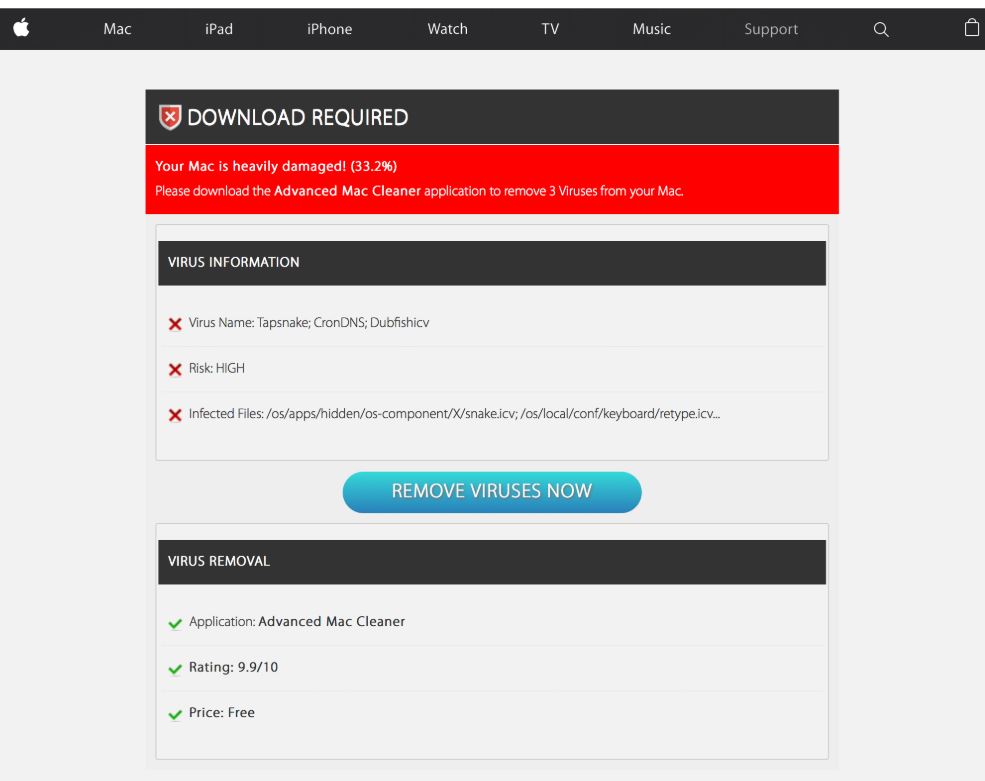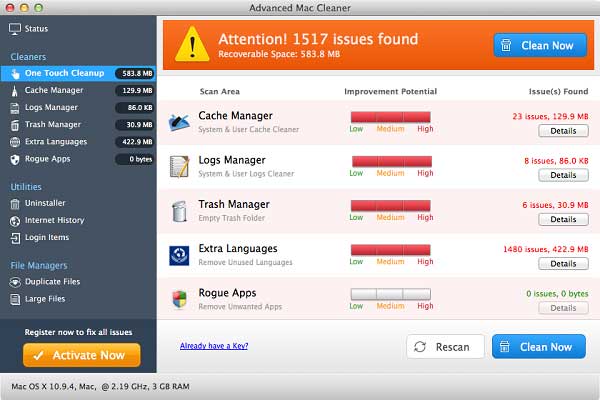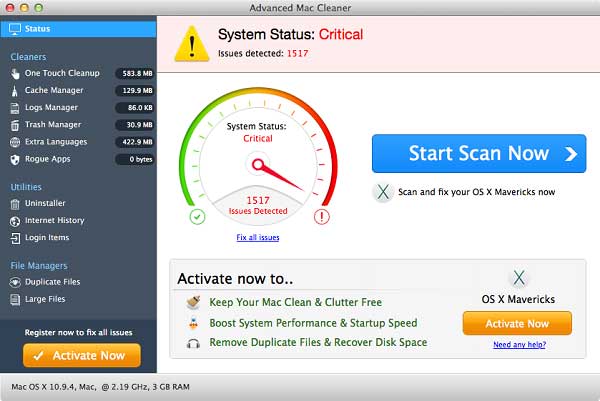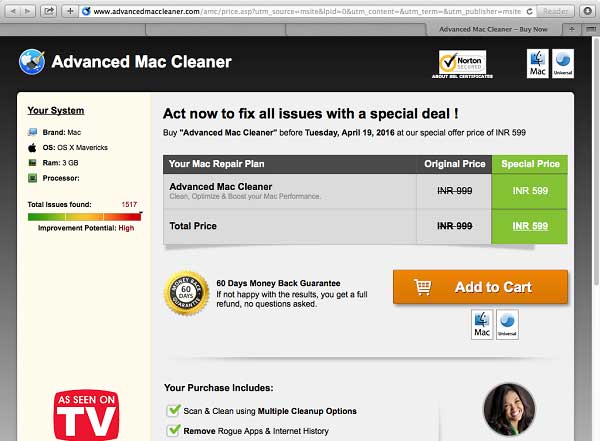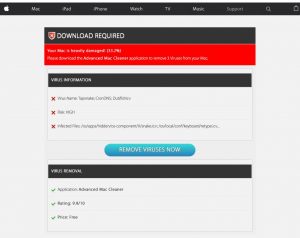 This article has been created with the main goal to explain what is the “Your Mac is Heavily Damaged” (Download Required) scam page, advertising Advanced Mac Cleaner and how you can remove this unwanted program from your Mac.
This article has been created with the main goal to explain what is the “Your Mac is Heavily Damaged” (Download Required) scam page, advertising Advanced Mac Cleaner and how you can remove this unwanted program from your Mac.
A scam page, advertising a hoax cleanup software, known as [wplinkpreview url=”https://sensorstechforum.com/remove-advanced-mac-cleaner-from-your-mac/”]Advanced Mac Cleaner has been detected by users and reported to lock their web browsers, pretending that their Mac is heavily damaged. In addition to this, the pop-up page also falsely advertises an infection with the Tapsnake virus, which is often used in relation to different [wplinkpreview url=”https://sensorstechforum.com/tapsnake-infection-mac-detected-tapsnake-scam-remove/”]Mac scams.
Threat Summary
| Name | "Your Mac Is Heavily Damaged" Scam |
| Type | Scam Page / PUP for Mac OS |
| Short Description | Aims to show a web page that locks the browser and threatens the user with malware infection. |
| Symptoms | The web browser begins displaying a web page pretending to come from Apple’s official site, but is in fact fake. The end goal is to download a program, called “Advanced Mac Cleaner”. |
| Distribution Method | The web page may appear as a result of opening a malicious ad or having adware that causes browser redirects to it. |
| Detection Tool |
See If Your System Has Been Affected by malware
Download
Combo Cleaner
|
User Experience | Join Our Forum to Discuss "Your Mac Is Heavily Damaged" Scam. |
“Your Mac is Heavily Damaged” – How Did I Get It
The main method via which the the “Your Mac is Heavily Damaged” page can spread is via potentially unwanted programs. These types of software often pose as legitimate apps and come bundled to other installers “as free extra”. And it is not easy to find these programs either, because often they are hidden in the “Advanced” or “Custom” installation steps, so fast clickers tend to skip and head for the Express installation option. They may pretend to also be toolbars and browser add-ons, but in reality they do nothing more but to display adware and the result of this is pages, like the “Your Mac is Heavily Damaged” landing on your Mac and locking it. Usually if this is the case, those programs are often falsely advertised on misleading web pages as useful software, like a file converter, a YouTube video downloader and other add-ins that supposedly improve your browsing experience, but instead flood your Mac with ads, like the “Your Mac is Heavily Damaged”. This is very profitable for adware developers, since they are the ones who profit from you visiting those pages automatically.
“Your Mac is Heavily Damaged” – More Information
Once you land on this page, the following screen is what you see:
In addition to intruding your Mac, the web page may also display other pop-ups with the same or similar message that may ask you to download a program, called Advanced Mac Cleaner.
This is a fake cleanup utility for Mac, which detects all sorts of viruses and errors that may not even be real and when you try to use it to remove these supposedly non-existent threats, Advanced Mac Cleaner wants to charge you money.
The main idea of this is to scam inexperienced users by using their fear that their information is compromised and they may lose access to their Apple IDs, Facebook profiles and even their e-banking accounts. This is why many will fall victims of this scam and use Advanced Mac Cleaner, thinking that the software is legitimate.
If you see this page, you probably think that this may just be a scam page, but it is never known for sure wether or not this page is caused by adware that may be residing on your Mac or in your web browser. This is why, if you see the page or have Advanced Mac Cleaner installed, we strongly recommend that you immediately remove them from your Mac and change your passwords. In addition to this, it is always best to backup your files as well, since such ad-supported programs may have even redirected you to malicious sites.
Remove Advanced Mac Cleaner and “Your Mac is Heavily Damaged”
If you want to remove the software causing the “Your Mac is Heavily Damaged” pop-ups and Advanced Mac Cleaner from your Mac, we advise you to follow the removal instructions underneath this article. They have been created with the clear purpose in mind to help you delete this virus either manually or automatically from both your MacOS and web browsers as well. Be advised, however, that experts always advise using an advanced anti-malware software, the main idea of which is to scan your Mac for any malicious programs and then use it’s algorithms to remove all malicious files and objects related to viruses and adware, like the unwanted program, causing “Your Mac is Heavily Damaged” pop-ups to appear.
Steps to Prepare Before Removal:
Before starting to follow the steps below, be advised that you should first do the following preparations:
- Backup your files in case the worst happens.
- Make sure to have a device with these instructions on standy.
- Arm yourself with patience.
- 1. Scan for Mac Malware
- 2. Uninstall Risky Apps
- 3. Clean Your Browsers
Step 1: Scan for and remove "Your Mac Is Heavily Damaged" Scam files from your Mac
When you are facing problems on your Mac as a result of unwanted scripts and programs such as "Your Mac Is Heavily Damaged" Scam, the recommended way of eliminating the threat is by using an anti-malware program. SpyHunter for Mac offers advanced security features along with other modules that will improve your Mac’s security and protect it in the future.
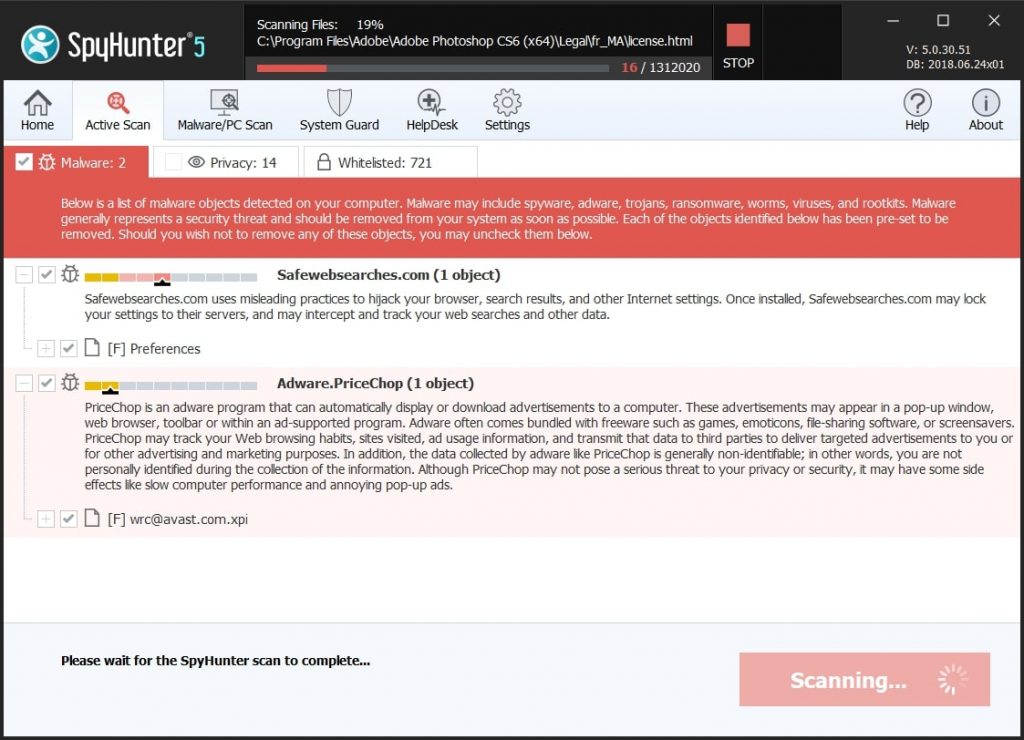
Quick and Easy Mac Malware Video Removal Guide
Bonus Step: How to Make Your Mac Run Faster?
Mac machines maintain probably the fastest operating system out there. Still, Macs do become slow and sluggish sometimes. The video guide below examines all of the possible problems that may lead to your Mac being slower than usual as well as all of the steps that can help you to speed up your Mac.
Step 2: Uninstall "Your Mac Is Heavily Damaged" Scam and remove related files and objects
1. Hit the ⇧+⌘+U keys to open Utilities. Another way is to click on “Go” and then click “Utilities”, like the image below shows:
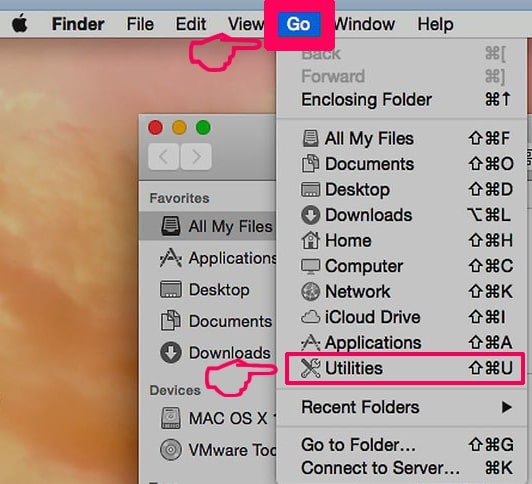
2. Find Activity Monitor and double-click it:
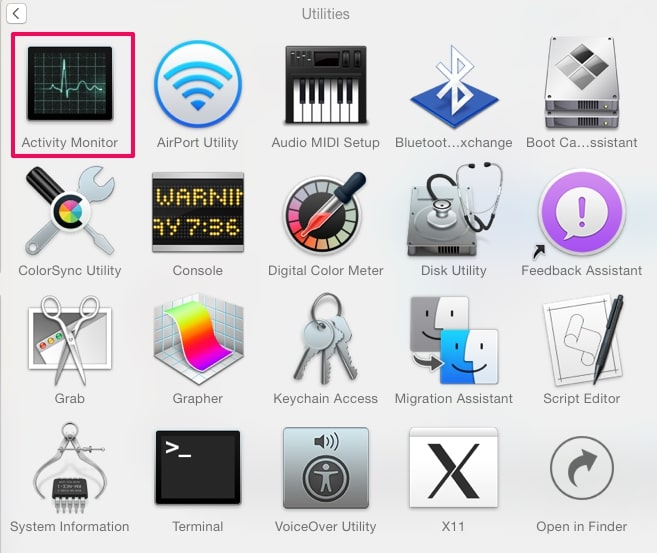
3. In the Activity Monitor look for any suspicious processes, belonging or related to "Your Mac Is Heavily Damaged" Scam:
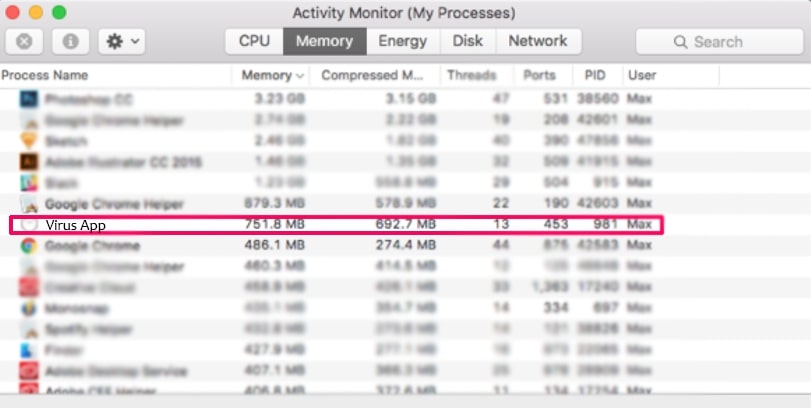
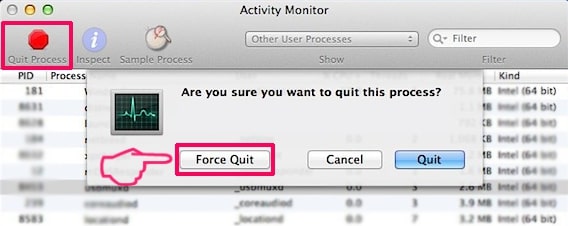
4. Click on the "Go" button again, but this time select Applications. Another way is with the ⇧+⌘+A buttons.
5. In the Applications menu, look for any suspicious app or an app with a name, similar or identical to "Your Mac Is Heavily Damaged" Scam. If you find it, right-click on the app and select “Move to Trash”.
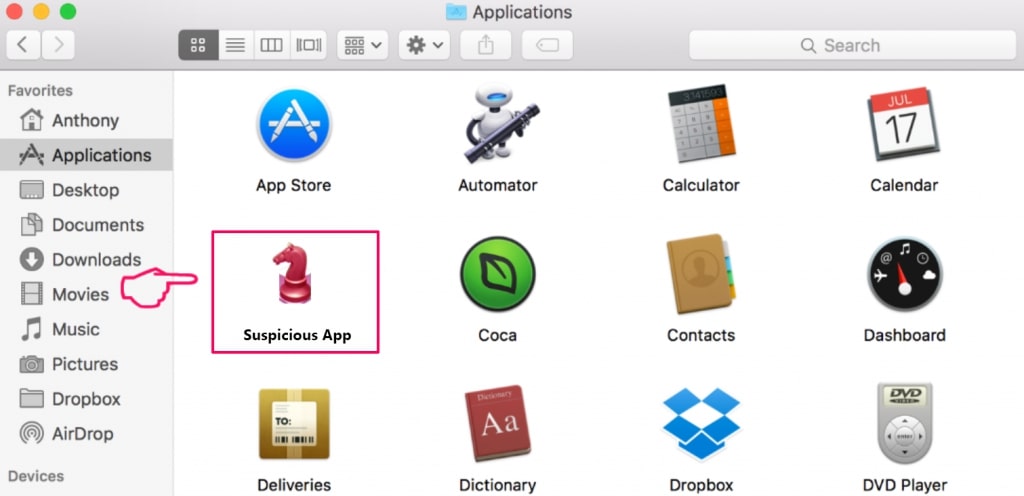
6. Select Accounts, after which click on the Login Items preference. Your Mac will then show you a list of items that start automatically when you log in. Look for any suspicious apps identical or similar to "Your Mac Is Heavily Damaged" Scam. Check the app you want to stop from running automatically and then select on the Minus (“-“) icon to hide it.
7. Remove any leftover files that might be related to this threat manually by following the sub-steps below:
- Go to Finder.
- In the search bar type the name of the app that you want to remove.
- Above the search bar change the two drop down menus to “System Files” and “Are Included” so that you can see all of the files associated with the application you want to remove. Bear in mind that some of the files may not be related to the app so be very careful which files you delete.
- If all of the files are related, hold the ⌘+A buttons to select them and then drive them to “Trash”.
In case you cannot remove "Your Mac Is Heavily Damaged" Scam via Step 1 above:
In case you cannot find the virus files and objects in your Applications or other places we have shown above, you can manually look for them in the Libraries of your Mac. But before doing this, please read the disclaimer below:
1. Click on "Go" and Then "Go to Folder" as shown underneath:
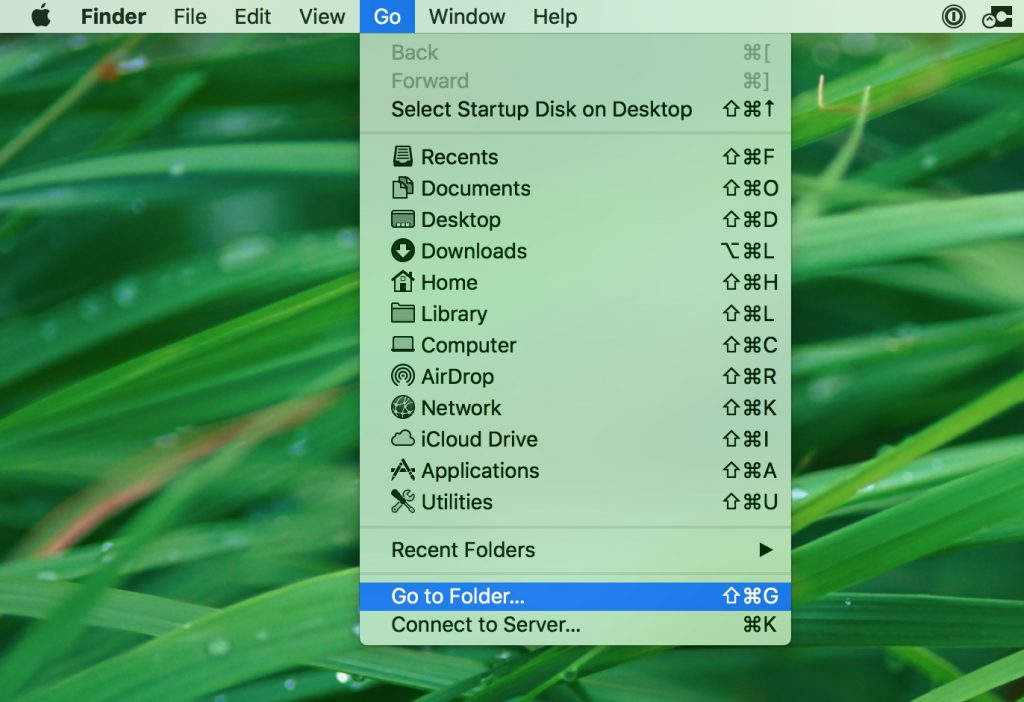
2. Type in "/Library/LauchAgents/" and click Ok:
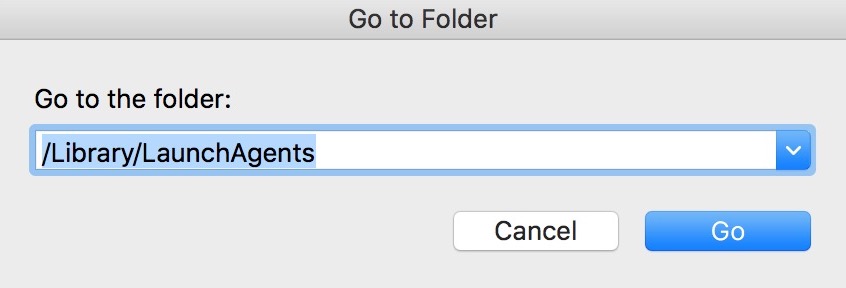
3. Delete all of the virus files that have similar or the same name as "Your Mac Is Heavily Damaged" Scam. If you believe there is no such file, do not delete anything.
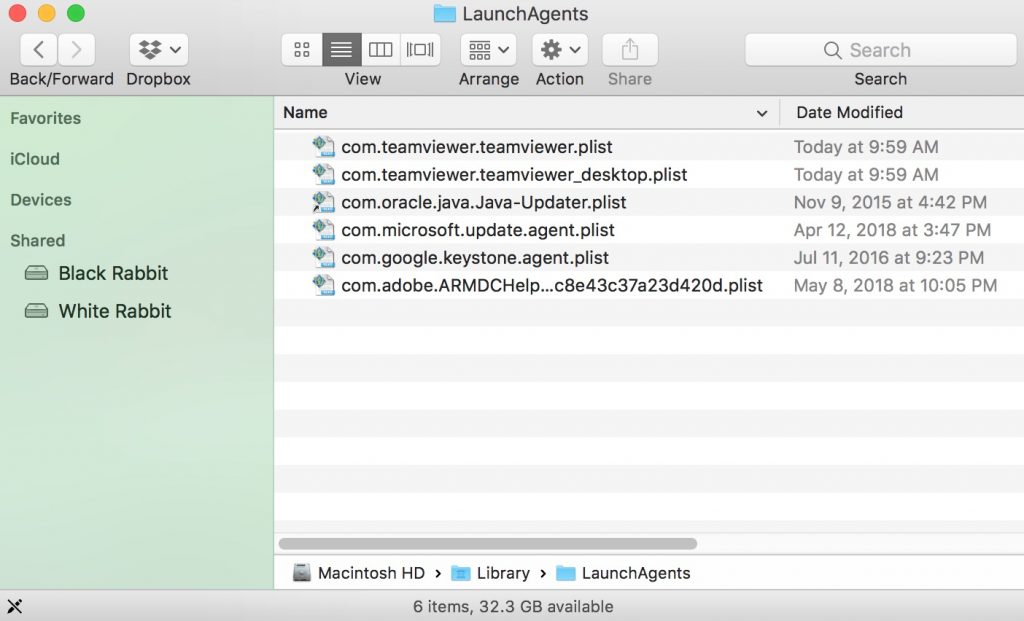
You can repeat the same procedure with the following other Library directories:
→ ~/Library/LaunchAgents
/Library/LaunchDaemons
Tip: ~ is there on purpose, because it leads to more LaunchAgents.
Step 3: Remove "Your Mac Is Heavily Damaged" Scam – related extensions from Safari / Chrome / Firefox
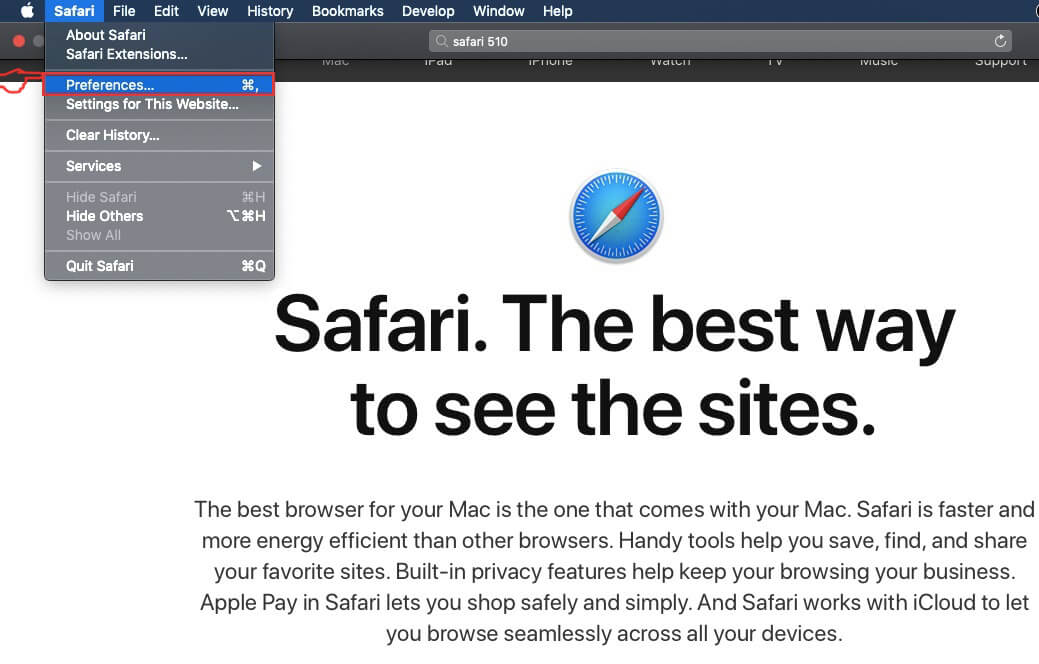

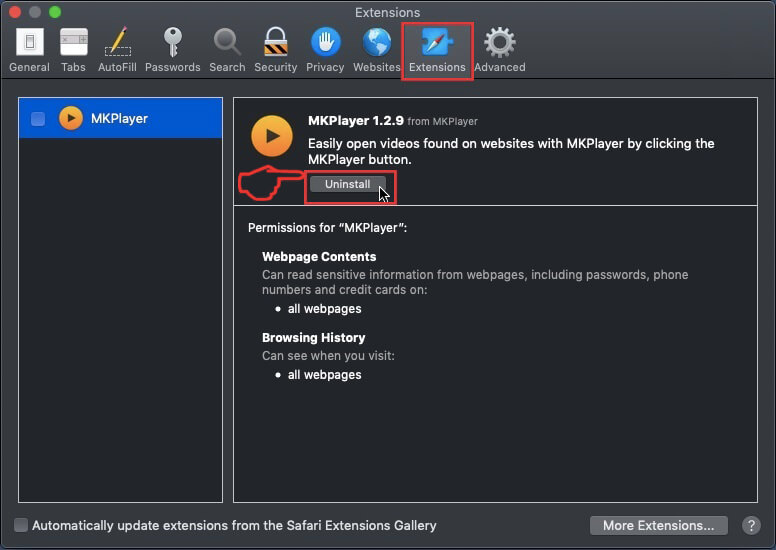
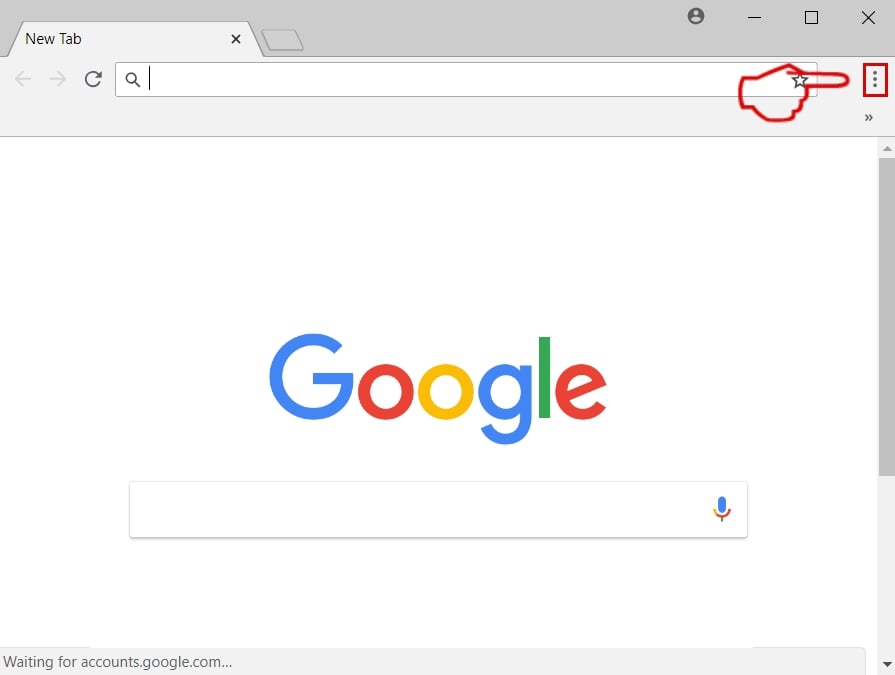
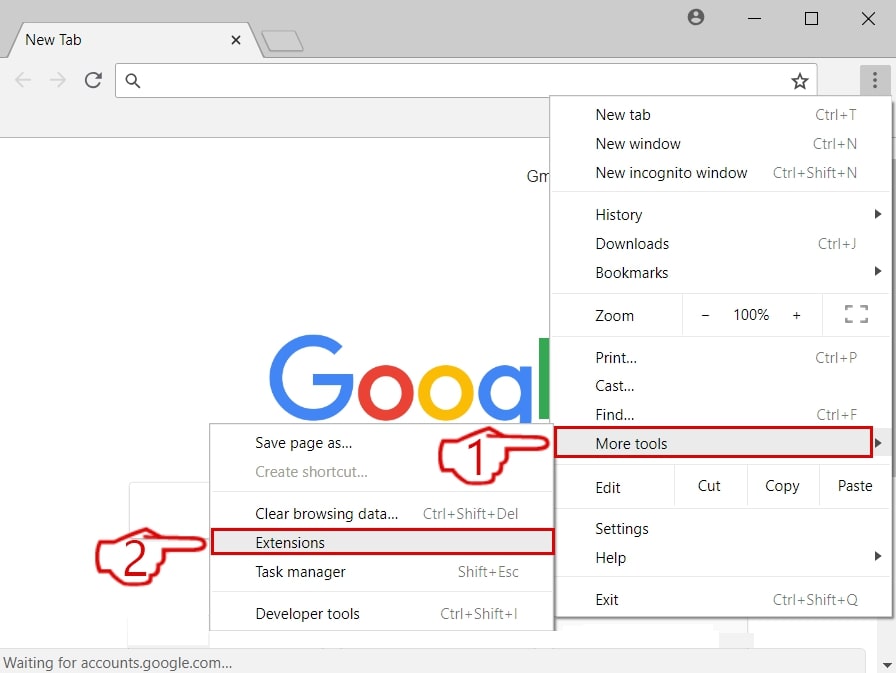
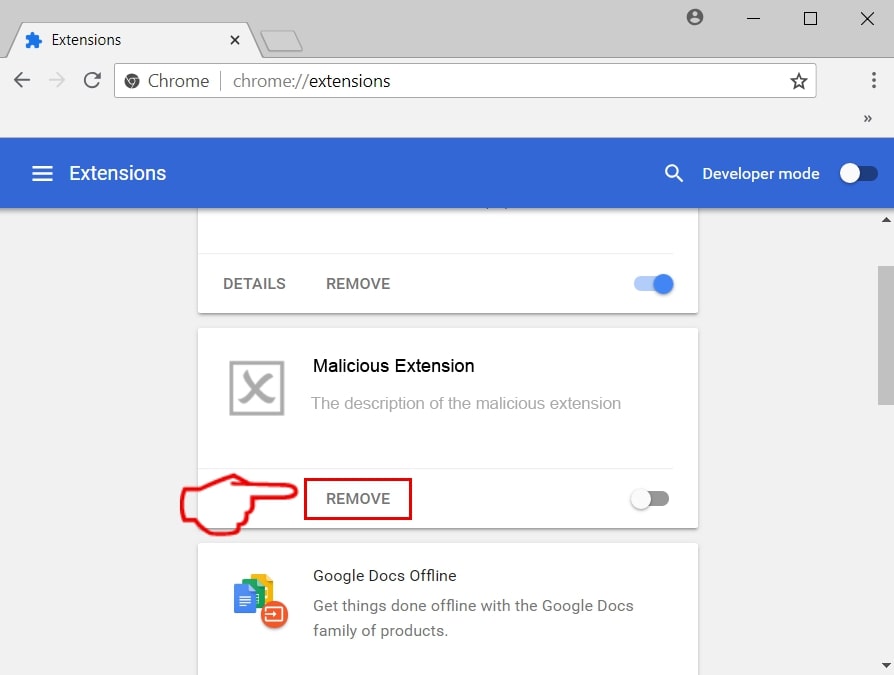
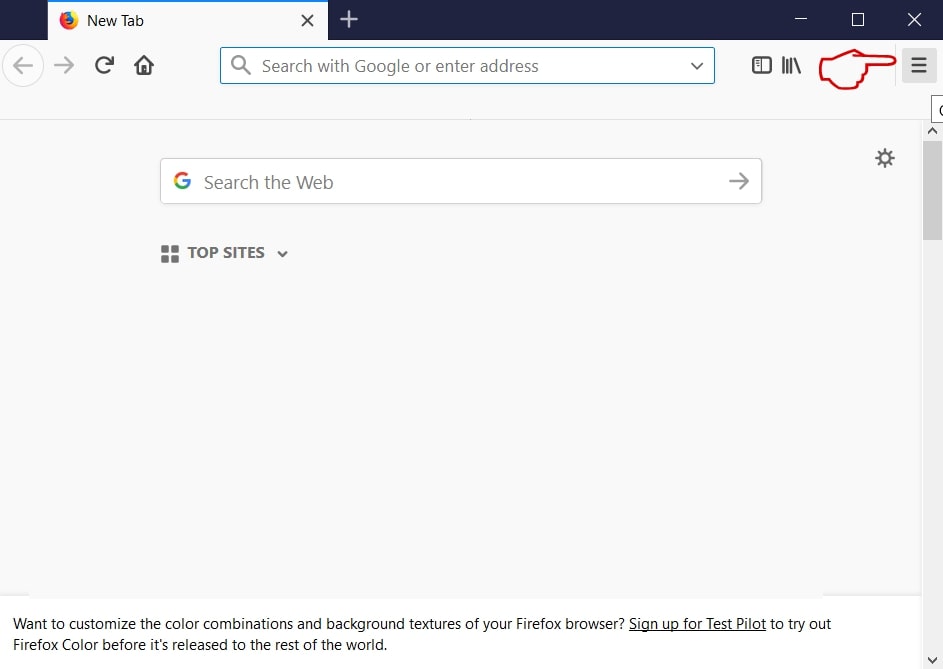
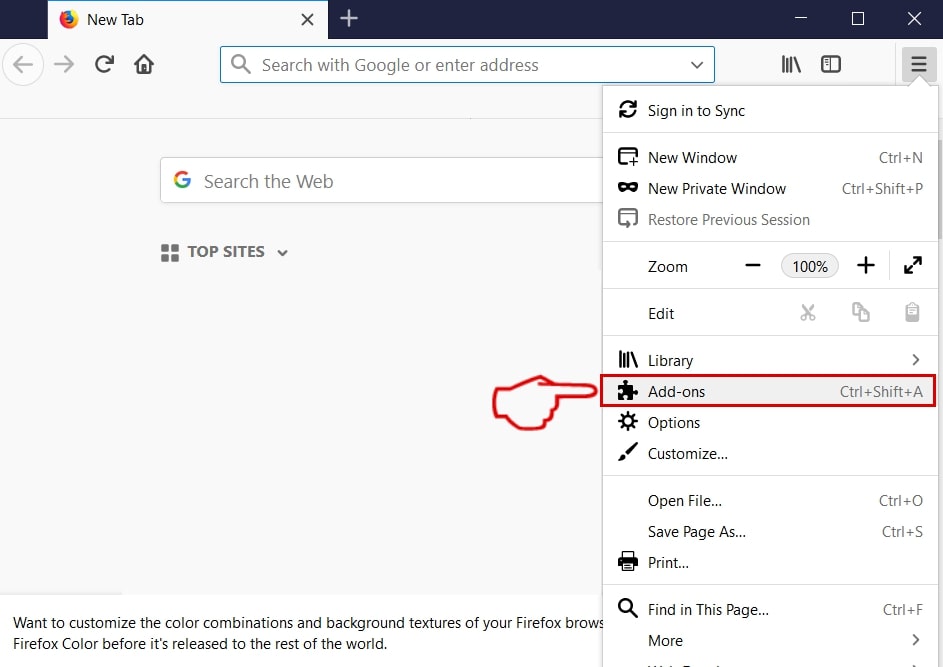
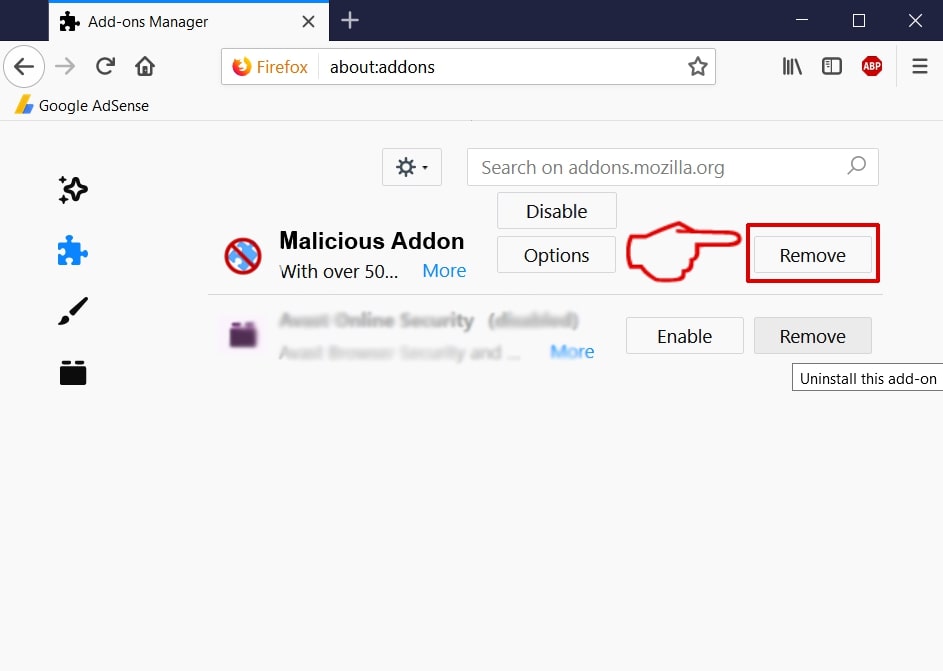
"Your Mac Is Heavily Damaged" Scam-FAQ
What is "Your Mac Is Heavily Damaged" Scam on your Mac?
The "Your Mac Is Heavily Damaged" Scam threat is probably a potentially unwanted app. There is also a chance it could be related to Mac malware. If so, such apps tend to slow your Mac down significantly and display advertisements. They could also use cookies and other trackers to obtain browsing information from the installed web browsers on your Mac.
Can Macs Get Viruses?
Yes. As much as any other device, Apple computers do get malware. Apple devices may not be a frequent target by malware authors, but rest assured that almost all of the Apple devices can become infected with a threat.
What Types of Mac Threats Are There?
According to most malware researchers and cyber-security experts, the types of threats that can currently infect your Mac can be rogue antivirus programs, adware or hijackers (PUPs), Trojan horses, ransomware and crypto-miner malware.
What To Do If I Have a Mac Virus, Like "Your Mac Is Heavily Damaged" Scam?
Do not panic! You can easily get rid of most Mac threats by firstly isolating them and then removing them. One recommended way to do that is by using a reputable malware removal software that can take care of the removal automatically for you.
There are many Mac anti-malware apps out there that you can choose from. SpyHunter for Mac is one of the reccomended Mac anti-malware apps, that can scan for free and detect any viruses. This saves time for manual removal that you would otherwise have to do.
How to Secure My Data from "Your Mac Is Heavily Damaged" Scam?
With few simple actions. First and foremost, it is imperative that you follow these steps:
Step 1: Find a safe computer and connect it to another network, not the one that your Mac was infected in.
Step 2: Change all of your passwords, starting from your e-mail passwords.
Step 3: Enable two-factor authentication for protection of your important accounts.
Step 4: Call your bank to change your credit card details (secret code, etc.) if you have saved your credit card for online shopping or have done online activiites with your card.
Step 5: Make sure to call your ISP (Internet provider or carrier) and ask them to change your IP address.
Step 6: Change your Wi-Fi password.
Step 7: (Optional): Make sure to scan all of the devices connected to your network for viruses and repeat these steps for them if they are affected.
Step 8: Install anti-malware software with real-time protection on every device you have.
Step 9: Try not to download software from sites you know nothing about and stay away from low-reputation websites in general.
If you follow these reccomendations, your network and Apple devices will become significantly more safe against any threats or information invasive software and be virus free and protected in the future too.
More tips you can find on our MacOS Virus section, where you can also ask any questions and comment about your Mac problems.
About the "Your Mac Is Heavily Damaged" Scam Research
The content we publish on SensorsTechForum.com, this "Your Mac Is Heavily Damaged" Scam how-to removal guide included, is the outcome of extensive research, hard work and our team’s devotion to help you remove the specific macOS issue.
How did we conduct the research on "Your Mac Is Heavily Damaged" Scam?
Please note that our research is based on an independent investigation. We are in contact with independent security researchers, thanks to which we receive daily updates on the latest malware definitions, including the various types of Mac threats, especially adware and potentially unwanted apps (PUAs).
Furthermore, the research behind the "Your Mac Is Heavily Damaged" Scam threat is backed with VirusTotal.
To better understand the threat posed by Mac malware, please refer to the following articles which provide knowledgeable details.


